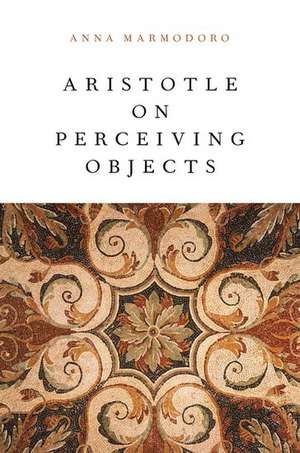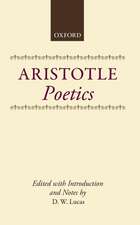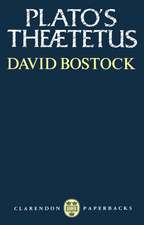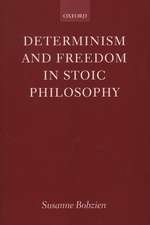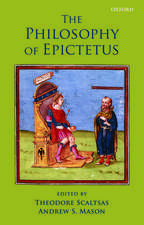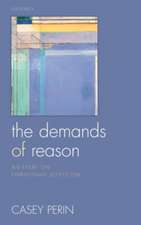Aristotle on Perceiving Objects
Autor Anna Marmodoroen Limba Engleză Hardback – 21 aug 2014
Preț: 632.53 lei
Preț vechi: 861.04 lei
-27%
Puncte Express: 949
Preț estimativ în valută:
111.81€ • 132.41$ • 97.40£
111.81€ • 132.41$ • 97.40£
Carte tipărită la comandă
Livrare economică 03-08 aprilie
Specificații
ISBN-13: 9780199326006
ISBN-10: 0199326002
Pagini: 304
Ilustrații: 3 illus.
Dimensiuni: 145 x 211 x 33 mm
Greutate: 0.43 kg
Editura: Oxford University Press
Colecția OUP USA
Locul publicării:New York, United States
ISBN-10: 0199326002
Pagini: 304
Ilustrații: 3 illus.
Dimensiuni: 145 x 211 x 33 mm
Greutate: 0.43 kg
Editura: Oxford University Press
Colecția OUP USA
Locul publicării:New York, United States
Recenzii
Marmodoro has done exemplary work in bringing us closer to understanding the details of Aristotle's theory of perception ... Her work will be necessary reading for anyone interested in the philosophy of perception, and by putting it into the context of contemporary power metaphysics she has made Aristotleâs theory of more than antiquarian interest.
The book is thoughtfully organized, written in a clear and lively style, and aimed at an audience that includes both contemporary philosophers and scholars of Aristotle alike. It provides an excellent introduction to many issues that have not gotten the extended and focused discussion they deserve. Very few books are the last word on a topic. But not all do the field a service, as Marmodoro's does, by stimulating further debate.
... this book offers a well detailed and original analysis of the metaphysical foundations of the Aristotelian conception of perception, and the content is very clear and very useful for those who want to examine in depth this important aspect of Aristotelian thought.
While I have some reservations about Marmodoroâs treatment of the perception of objects, her treatment of powers in general is excellent, and the work to which she puts them in grounding realism is convincing and illuminating. Moreover, while I am ultimately unconvinced by the robust account of the common sense that she offers, I found her arguments there to be stimulatingâa formidable challenge for future work in the area.
In Aristotle on Perceiving Objects, she [Marmodoro] aims to provide an accurate interpretation of Aristotle's views about perception, but she also wants to present and defend his account in a way that will aid her contemporaries as they grapple with the very same problems that exercise Aristotle. She succeeds remarkably in both tasks.
There is much that is valuable in this book. Marmodoro opens up with great skill and intelligence the world of Aristotle's concerns in these areas, persuasively and illuminatingly presenting them as live issues. She handles comparisons between various competing interpretations of the Aristotelian texts very deftly, and her writing is fluent and vivid.
... the work succeeds in advancing a new approach to Aristotle's theory of perception and perceptual experience relating them to the metaphysical notion of causal powers, offering discussions of interest to advanced student and specialist alike.
This is an excellent book on a topic of considerable historical and ongoing philosophical interest. It is well organized and well written, and its central claims and lines of argument are easy to follow. These main claims are frequently highly original, while the problems with competing views are clearly explained. The book reflects a great deal of work and thought by Marmodoro on the topics it treats. It should serve as a touchstone for debates about Aristotle's general theory of causal powers, his perceptual realism, and his views on the unity of the perceptual faculty for many years to come
[Marmodoro's] book is written with unusual verve and formidable ambition. It sets out to solve the most difficult problems in Aristotle's theory of perception, and it promises to do so in the best philosophical spirit, namely by cutting reality 'at its joints' at the most fundamental level, which, according to Marmodoro, is the level of the metaphysics of powers. Accordingly, her argument starts with a metaphysical discussion of Aristotle's conception of powers, causation, and change, and then applies the results to his theory of human perception. The outcome is a highly innovative, at times almost dazzling array of fresh, often controversial, and unfailingly thought-provoking, discussions of a whole plethora of issues in Aristotle's metaphysics and theory of perception.
The book is thoughtfully organized, written in a clear and lively style, and aimed at an audience that includes both contemporary philosophers and scholars of Aristotle alike. It provides an excellent introduction to many issues that have not gotten the extended and focused discussion they deserve. Very few books are the last word on a topic. But not all do the field a service, as Marmodoro's does, by stimulating further debate.
... this book offers a well detailed and original analysis of the metaphysical foundations of the Aristotelian conception of perception, and the content is very clear and very useful for those who want to examine in depth this important aspect of Aristotelian thought.
While I have some reservations about Marmodoroâs treatment of the perception of objects, her treatment of powers in general is excellent, and the work to which she puts them in grounding realism is convincing and illuminating. Moreover, while I am ultimately unconvinced by the robust account of the common sense that she offers, I found her arguments there to be stimulatingâa formidable challenge for future work in the area.
In Aristotle on Perceiving Objects, she [Marmodoro] aims to provide an accurate interpretation of Aristotle's views about perception, but she also wants to present and defend his account in a way that will aid her contemporaries as they grapple with the very same problems that exercise Aristotle. She succeeds remarkably in both tasks.
There is much that is valuable in this book. Marmodoro opens up with great skill and intelligence the world of Aristotle's concerns in these areas, persuasively and illuminatingly presenting them as live issues. She handles comparisons between various competing interpretations of the Aristotelian texts very deftly, and her writing is fluent and vivid.
... the work succeeds in advancing a new approach to Aristotle's theory of perception and perceptual experience relating them to the metaphysical notion of causal powers, offering discussions of interest to advanced student and specialist alike.
This is an excellent book on a topic of considerable historical and ongoing philosophical interest. It is well organized and well written, and its central claims and lines of argument are easy to follow. These main claims are frequently highly original, while the problems with competing views are clearly explained. The book reflects a great deal of work and thought by Marmodoro on the topics it treats. It should serve as a touchstone for debates about Aristotle's general theory of causal powers, his perceptual realism, and his views on the unity of the perceptual faculty for many years to come
[Marmodoro's] book is written with unusual verve and formidable ambition. It sets out to solve the most difficult problems in Aristotle's theory of perception, and it promises to do so in the best philosophical spirit, namely by cutting reality 'at its joints' at the most fundamental level, which, according to Marmodoro, is the level of the metaphysics of powers. Accordingly, her argument starts with a metaphysical discussion of Aristotle's conception of powers, causation, and change, and then applies the results to his theory of human perception. The outcome is a highly innovative, at times almost dazzling array of fresh, often controversial, and unfailingly thought-provoking, discussions of a whole plethora of issues in Aristotle's metaphysics and theory of perception.
Notă biografică
Anna Marmodoro is a Fellow in Philosophy of Corpus Christi College, University of Oxford. She specializes in ancient philosophy and contemporary metaphysics, and currently directs a major research project in metaphysics funded by the European Research Council.
